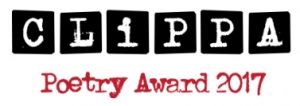
The CLiPPA (Centre for Literacy in Primary Poetry Award) for a book of poetry for children was launched in 2003 by CLPE (Centre for Literacy in Primay Education). This is the only award for published poetry for children, highlighting an important branch of children’s literature and ensuring that it receives proper recognition. The award is presented annually for a book of poetry published in the preceding year. Throughout the 15 years of CLiPPA, CLPE has continued to shine a light on poetry for children as a fundamental element in the development of children’s literacy. Commitment to poetry through the educational resource website Poetryline
and CLPE’s Power of Poetry training for teachers, combined with the profile and prestige of CLiPPA, have contributed to
the number of publisher submissions for the poetry award increasing by 50% from 2016 to 2017.
The 2017 shortlist is
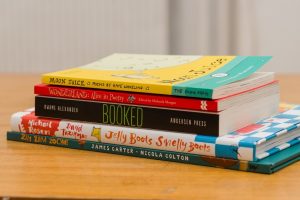
– Booked, by Kwame Alexander. A free verse novel, written in the voice of 12 year old soccer-loving boy.
– Zim Zam Zoom! by James Carter. Perfectly pitched for the young listener or early reader with plenty of opportunities for joining in.
– Wonderland; Alice in Poetry by Michaela Morgan (editor). Anthology celebrating the spirit of Wonderland with each poet bringing their own refreshing spin.
– Jelly Boots, Smelly Boots by Michael Rosen. Quirky, clever poems from those that involve humorous misunderstandings to thoughtful and more intimate musings.
– Moon Juice by Kate Wakeling. A debut collection of poetry that presents magical, strange and unlikely events in a confident and persuasive way.
The judging panel is chaired by the poet and CLiPPA 2012 winner, Rachel Rooney along with Sarah Crossan, poet and CLiPPA 2016 joint winner for One, Caleb Femi, poet and the Young People’s Laureate for London, Charlotte Hacking, CLPE Learning Programme Leader and Imogen Russell Williams, children’s book critic and editorial consultant.

I am delighted to welcome shortlisted author James Carter to Library to talk about celebrating poetry in schools
CLIMB A POEM!
by James Carter
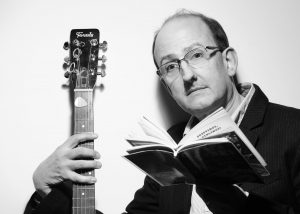
There’s a large Primary school a few miles down my road in which every single class from Reception to Yr 6, every single teacher reads a poem to their children every single morning. Why? Because, without wishing to overstate the case here, the school has realised that this can make a significant difference to both the literacy and oracy skills of each and every child – and ultimately develop them as thinkers, listeners, readers, writers and lovers of literature.
Having visited 1000+ Primary schools all over the UK in the last 15 years – doing performances, running workshops and family sessions, as well as INSET days, I’ve come to a few conclusions about poetry in the Primary classroom.
First, children do not have the hang ups with poetry that many adults have. It seems to me that many adults perceive poetry as ‘difficult’ and ‘boring’ as a result of having had to deconstruct poetry at GCSE level.
James Carter – Why is poetry important? from CLPE on Vimeo.
Not so children. They readily respond to poetry’s brevity, its playfulness, its humour, its fun, its musicality – its rhythms, rhymes and repetitions – but also its ability to represent the world in a way that prose fiction can’t so succinctly do. Children also enjoy the way that poetry turns the world upside down, looks at the world afresh and finds a variety of creative ways to articulate emotions, observations and experiences. Children will readily write poems too. A poem is a little burst of energy, something that can be done in the moment, there and then. Prose fiction takes time, takes planning. Children live in the ‘now’ and poems are very ‘now’. Given the right encouragement, children can learn to craft their poems or ‘tweak’ them, as I prefer to say. Just two little tweaks in a poem can make a significant difference to the poem as a whole and this very process allows children to see the benefit from choosing the right word or phrase to express what you want to say. Furthermore, every day I visit a school I am amazed at quite how profound and philosophical 9, 10 and 11 year olds can be in their poetry writing.
Far fewer teachers are nowadays informing me that poetry is ‘scary’ and, because it has become far more central to the National Curriculum, teachers are grasping the nettle and really giving poetry a go. They admit to me how surprised they have been by the wonderful and instantaneous results. They’ve noticed that boys respond well to poetry, and along with non-fiction, have found that it’s a genre perfect for getting those boys and reluctant readers/writers on board. So many Primaries are now having poetry weeks instead of book weeks, or having an additional poetry week in the Summer term after SATs. Good stuff!
Let’s get practical. Teachers need books for younger children, so try The Puffin Book Of Fantastic First Poems, Gaby Morgan’s A First Poetry Book, Mustard, Custard, Grumble Belly And Gravy by Michael Rosen and (hey, why not..) even my own Zim Zam Zoom / Hey, Little Bug! / I’m A Little Alien.
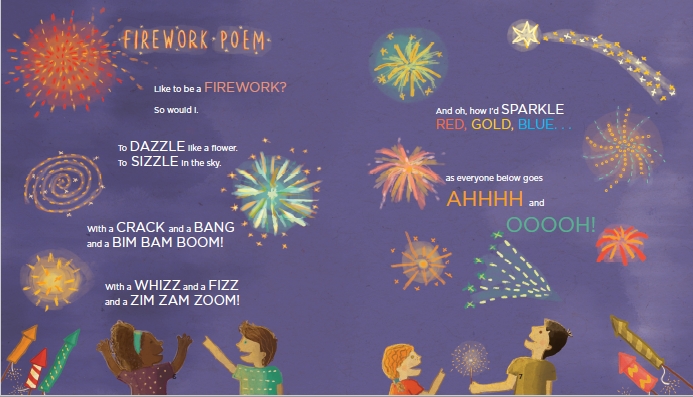
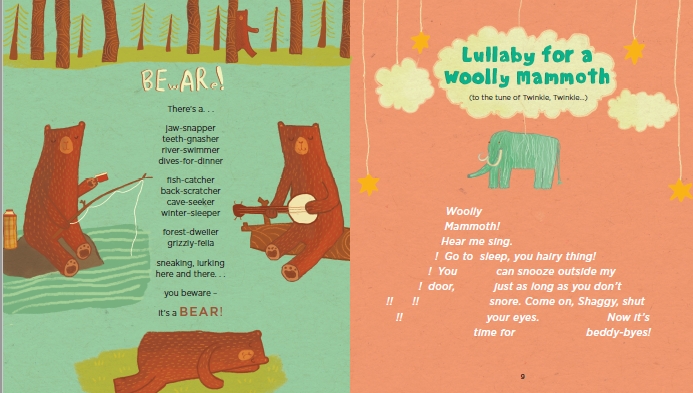

Read your class a poem every day. Perhaps have a theme – one week do weather poems, another the seasons, or emotions, or shape poems or funny poems. Put up and regularly change a poetry display in the classroom, including the children’s own poems. Put out a box of poetry books for children to dip in and out of.
When reading poems aloud, try a call and response approach. Find a short poem, and read a line to your class, and then get them to say it back to you. Do this for the whole poem. Even try an onset-and-rhyme approach. Read a rhyming poem to them, and then a second time, but now leave a pause when you get to each rhyme and encourage the class to fill in the gap.
Put on a poetry show in the hall. Get whole classes to learn poems, do actions to them, even dress up or make costumes. Ask volunteer children to do poems as solos or as pairs or small groups. Or try whole class poems on specific themes as part of whole class assemblies.
On a chosen day, perhaps part of a Book Week, have all teachers/TAs (or Totally Awesomes as I like to call them..) do a tour of the classrooms, reading their favourite children’s poems.
Poetry modules are great, but poetry is at its very best and arguably most dynamic and creative when it is responding cross-curricular areas/class topics. So why not try a Henry V111 kenning, a volcano or river shape poem, a rainforest haiku or a Roman rap for starters!
Invite a poet in for a day. Ask them to do assemblies for different Key Stages, run workshops in the classrooms and host a Finale at the end of the day. I’ve concluded that once teachers have observed how poets do performances and run workshops they are far more likely to give poetry a go themselves as they realise how doable, how simple and fun and ultimately rewarding on many levels poetry can be.
And teachers do not need to be experts in poetry. Far from it! They can simply introduce children to a few forms of poetry (these are all easily Google-able and all covered in my book Let’s Do Poetry In Primary Schools).
Some of the very best performances of poetry by children I’ve ever witnessed were back in March of this year by boys aged 5-7 from a small prep school in Chiswick. They were all solo performances and done with such passion, verve, humour, subtlety and intelligence that it made me rethink what younger children are capable of in terms of performing.
As children hear poems, and even learn and perform poems, they are internalising all the things that poetry and indeed language can be. The more poems that children can actually learn the better, as learnt poems will greatly inform children’s own poetry and indeed prose-writing skills.
Once you have learnt a poem, you carry it around in your head forever. If I had my way, all children would leave Primary school knowing at least 12 poems off by heart.
So many teachers used to say to me that they couldn’t see the value of doing poetry, but this thankfully has changed. If poetry is a hill, prose is a mountain. Ultimately, whether we like it or not, teachers will be assessing children in their prose writing – but the more hills you can climb, the better the mountaineer you will be.
****
Many thanks James!
James Carter travels all over the UK to schools, libraries and festivals to give lively poetry/music performances as well as workshops. His critically-acclaimed poetry books include Journey To The Centre Of My Brain (Macmillan), The World’s Greatest Space Cadet (Bloomsbury), Hey, Little Bug! (Frances Lincoln) Zim Zam Zoom! (Otter-Barry Books) as well as a resource book for teachers, Let’s Do Poetry In Primary Schools! (Bloomsbury). A former lecturer at Reading University in Creative Writing and Children’s Literature, James offers INSET days on writing and poetry performing poetry in the Primary classroom.
www.jamescarterpoet.co.uk
@jamescarterpoet
You can buy a copy of Zim Zam Zoom here.
The winner of the CLiPPA will be announced on 14 July.

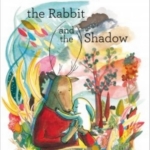
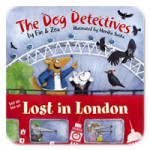

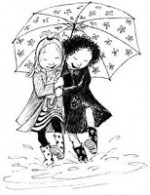
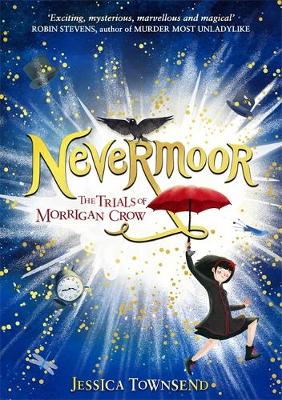
Fantastic interview, thank you!